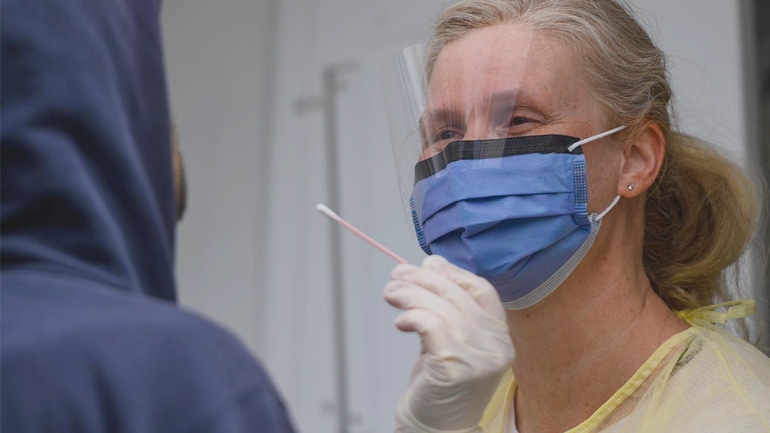"Can I stay here?"
It was a simple question posed to Megan MacBride by a man experiencing homelessness minutes after he was moved into a Halifax hotel room in April to quarantine safely from the COVID-19 global health emergency.
Like most hotel rooms, this one had a private bathroom with running water, and wasn't anything like the crowded shelters the man normally frequented, and where his chances of being infected with COVID-19 (or infecting others) could potentially increase.
"If I can stay here," the man said to MacBride, "I think I could really turn my life around."
As a community social worker with the North End Community Health Centre (NECHC) in Halifax, Nova Scotia, when MacBride first heard the question, it took her by surprise. But her surprise quickly turned to anger.
"A person experiencing homelessness can't participate in stay-at-home orders and closing down public spaces means people don't have places to go during the day," said MacBride, adding that some clients have chronic illnesses like diabetes or heart diseases, making them more susceptible to the virus.
"Not having access to public washrooms makes it hard to stay on top of hygiene in normal circumstances, especially for women experiencing homelessness," said MacBride. "Regardless of the pandemic, the question just made me feel like this is how people should be treated all the time."
A quick shift of focus
Outside of the pandemic, the NECHC typically works with about 500 individuals experiencing homelessness in the area each year through a variety of services, including a primary mobile health care clinic offering addiction management services, dentalcare, pre-and-post natal care, and mental health supports.
The primary health care team administers these services via a mobile health clinic set up in a Sprinter van that is often parked at various locations in the North End community of Halifax, and which is outfitted with a fridge for medical supplies, and a system to access electronic medical records, stirrups, and a defibrillation device.
When Halifax began reporting initial cases of COVID-19, the NECHC quickly shifted its focus by administering about 1,000 tests for the virus along with moving about 40 of its immuno-compromised clients off the street and into hotel spaces so they could safely isolate as shelters were overcrowded.
"It was contributions like the one we received from TD that allowed us to start getting some of our clients into hotels,” said Marie-France LeBlanc, Executive Director of the NECHC, referring to the funding the organization received through the TD Community Resilience Initiative.
"We have a budget for our normal day-to-day operations, but when COVID hit it pushed us to have to operate outside our usual scope of work. We couldn’t have been as responsive without that support."
TD steps in to help with "seed money"
One of the aims of the TD Community Resilience Initiative, a $25-million initiative established by the Bank through the TD Ready Commitment when COVID-19 hit, is to assist community-based organizations respond to the immediate and long-term needs of community members during the pandemic. As part of the initiative, TD provided support to the Canadian Association of Community Health Centres and the U.S. National Association of Community Health Centers to support COVID-19 response in Canada and the U.S.
For the NECHC, this support helped fun emergency shelter spaces, food, and medicine.
LeBlanc said the organization was founded 49 years ago by three physicians to treat the predominantly Black members of the community in Halifax's North End at a time when racist practises made many wary of seeking medical care from traditional healthcare providers. Now, the team has grown to 55 people.
"A lot of folks experiencing homelessness say they don't feel equally treated in traditional medical systems and so are mindful of it," said LeBlanc.
"We've been here for a while. When the pandemic hit this community, we were trusted to administer throat swabs and other care at a time when so much mis-information about the virus and what can happen to you was swirling."
LeBlanc said that the grant given by TD was the first the organization received, acting as "seed money" to be able to pivot quickly before funding from other organizations followed.
"TD was very responsive," said LeBlanc.
For MacBride, the ability to respond during the pandemic in a way that made more vulnerable members of the local community feel safe was a reminder of how all members of society, she says, should be treated, pandemic or not.
"This man was so grateful," recalls MacBride. "This was more than a hotel room for his physical safety. It was being treated with dignity and respect that made all the difference in the world for him. These are things many of us take for granted."
